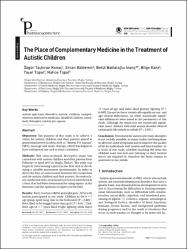| dc.contributor.author | Konaç, Özgur Taşkıran | |
| dc.contributor.author | Baldemir, Ercan | |
| dc.contributor.author | Inanç, Betül Battaloğlu | |
| dc.contributor.author | Kara, Bilge | |
| dc.contributor.author | Topal, Yaşar | |
| dc.contributor.author | Topal, Hatice | |
| dc.date.accessioned | 2020-11-20T15:02:40Z | |
| dc.date.available | 2020-11-20T15:02:40Z | |
| dc.date.issued | 2016 | |
| dc.identifier.issn | 2093-6966 | |
| dc.identifier.issn | 2234-6856 | |
| dc.identifier.uri | https://doi.org/10.3831/KPI.2016.19.004 | |
| dc.identifier.uri | https://hdl.handle.net/20.500.12809/2564 | |
| dc.description | WOS: 000383281500004 | en_US |
| dc.description | PubMed ID: 27280047 | en_US |
| dc.description.abstract | Objectives: The purpose of this study is to achieve a vision for autistic children and their parents aimed at generating interest in ideas such as "Sanitas Per Aquam" (SPA), massage and music therapy, which has begun to have widespread use and to attract attention. Methods: This cross-sectional, descriptive study was carried out with autistic children and their parents from February to April 2015 in Mugla, Turkey. The study was began by interviewing experts in the field and by developing a suitable assessment questionnaire. In order to direct the flow of conversation between the researchers and the autisitc children and their parents, the researchers conducted semi-structured face to face interviews in a form that had been determined by using reports in the literature and the opinions of experts in the field. Results: Forty two boys (84%) and eight girls (16%) with autism participated in our study. Children in the 0 - 7 age group spent long time in the bathroom (P = 0.001). Boys liked to be hugged more than girls (P = 0.01). Children ages 0 - 7 years liked bright lighting while those 15 years of age and older liked gloomy lighting (P = 0.009). Except for these statistically significant sex-and age-related differences, no other statistically significant differences were noted in the parameters of this study. Although the result was not statistically significant, more children with mild autism disorder obeyed commands like inhale or exhale (P = 0.051). Conclusion: Treatment for autism spectrum disorders is not yet fully possible, so many studies are being done to alleviate some symptoms and to improve the quality of life for individuals with autism and their families. As a result of our study, whether touching the areas the children want touched and listening to their favorite music are required to stimulate the brain remain as questions in our minds. | en_US |
| dc.item-language.iso | eng | en_US |
| dc.publisher | Korean Pharmacopuncture Inst | en_US |
| dc.item-rights | info:eu-repo/semantics/openAccess | en_US |
| dc.subject | Autism Spectrum Disorders | en_US |
| dc.subject | Autistic Children | en_US |
| dc.subject | Complementary Alternative Medicine | en_US |
| dc.subject | Disabled Children | en_US |
| dc.subject | Mind-Body Therapies | en_US |
| dc.subject | Sanitas Per Aquam | en_US |
| dc.title | The Place of Complementary Medicine in the Treatment of Autistic Children | en_US |
| dc.item-type | article | en_US |
| dc.contributor.department | MÜ, Tıp Fakültesi, Dahili Tıp Bilimleri Bölümü | en_US |
| dc.contributor.institutionauthor | Konaç, Özgur Taşkıran | |
| dc.contributor.institutionauthor | Baldemir, Ercan | |
| dc.contributor.institutionauthor | Inanç, Betül Battaloğlu | |
| dc.contributor.institutionauthor | Kara, Bilge | |
| dc.contributor.institutionauthor | Topal, Yaşar | |
| dc.contributor.institutionauthor | Topal, Hatice | |
| dc.identifier.doi | 10.3831/KPI.2016.19.004 | |
| dc.identifier.volume | 19 | en_US |
| dc.identifier.issue | 1 | en_US |
| dc.identifier.startpage | 28 | en_US |
| dc.identifier.endpage | 36 | en_US |
| dc.relation.journal | Journal of Pharmacopuncture | en_US |
| dc.relation.publicationcategory | Makale - Uluslararası Hakemli Dergi - Kurum Öğretim Elemanı | en_US |


















